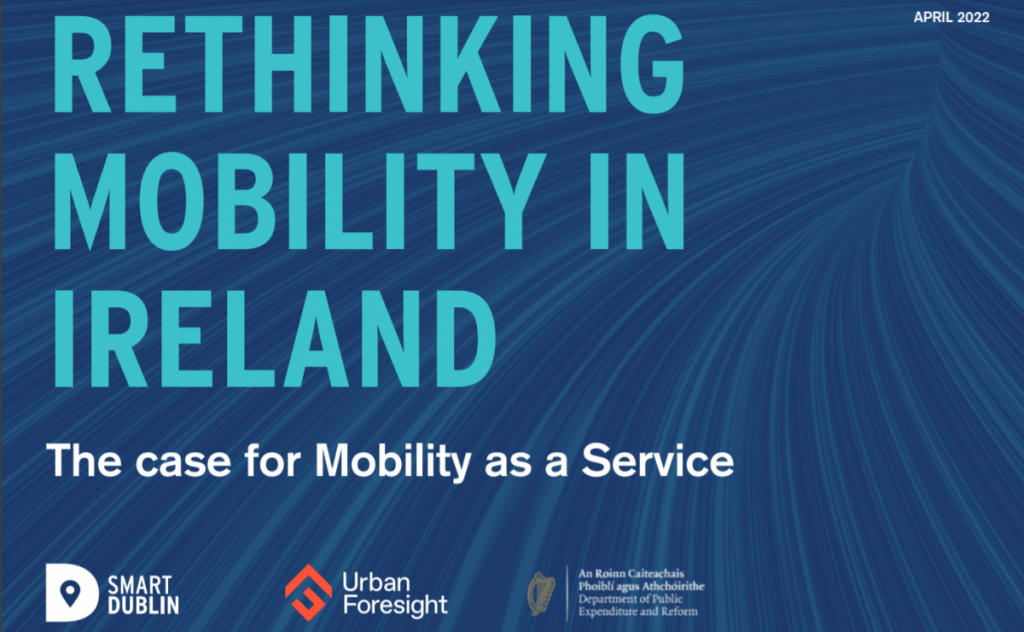Smart Dublin's thought leadership on MaaS for Ireland
What will it take for Ireland to be MaaS ready? POLIS member, Smart Dublin has released a report outlining a Mobility as a Service (MaaS) model for Ireland led by public authorities, examining milestones reached, the next steps required, and which stakeholders have a role to play.
As technologies rapidly develop, new mobility services emerge and public-private partnerships are established, cities, regions and mobility operators are looking to apps and/or digital platforms that bring a range of transport options into one place, prompting the modal shift we urgently need.
The thought leadership document is the result of a collaboration between Smart Dublin and Urban Foresight, funded by the Department of Public Expenditure and Reform through its Public Sector Innovation Fund. It has been released in conjunction with Ireland’s National Sustainable Mobility Policy, which sets out a strategic framework to 2030 for active travel (walking and cycling) and public transport journeys to help Ireland meet its climate obligations.
The National Sustainable Mobility Policy sets out a strategic framework to 2030 for active travel (walking and cycling) and public transport journeys to help Ireland meet its climate obligations.
The paper, which explores the current urban mobility landscape, examining how data, policy and governance can enhance MaaS provisions across Ireland, supporting modals shifts, encouraging public transport uptake and meeting climate targets. The report emphasises the potential for MaaS to offer customised information and integrated transport for users, improving access and reducing cost, while simultaneously providing providers with data on travel patterns.
There are already a range of projects creating momentum for sustainable mobility in Ireland; including, a new journey planner under the Transport for Ireland (TFI), Next Generation Ticketing (NGT), an NTA project to renew ticketing infrastructure and introduce an account-based ticketing payment system, as well as several public transportation and infrastructure projects like mobility hubs and DART+. At the same time, Dublin councils are already considering better data arrangements for existing and new shared mobility regulation (e.g. bike-sharing, car-clubs, escooters).
The report explores how other cities have been developing and deploying MaaS services, and how these international experiences could be applied in Ireland.
Smart Dublin’s proposed vision for MaaS in Ireland is:
‘Foundational market conditions for a dynamic range of mobility services, which empowers innovation, but on terms set by public oversight. MaaS for Ireland should be a long-term investment in a system, not a short-term investment in a particular front-end technology.’
Smart Dublin outlines a series of recommendations which it believes should underpin MaaS developments:
- It should allow public authorities to define what is best for society and reflect those in a MaaS system.
- Be practical about pressures on public authorities – and keep their options open
- Respect the reality of consumer behaviour on app use.
- Don’t limit transport options in ‘walled gardens’ of options
- Encourage innovation
The document also provides a set of recommendations for how to best deliver those actions, and the next steps necessary to do so. It calls on the Department for Transport to describe an overall vision for a MaaS system for Ireland and confirm its objectives; while the NTA is called on to identify a suitable organisation for developing the proposed model in this document on public terms. Councils also have a role in this, factoring in better data sharing and reporting into existing and new shared mobility regulation.
You can read the full document here: Rethinking-Mobility-in-Ireland_Smart-Dublin_FINAL-1.pdf (smartdublin.ie)

